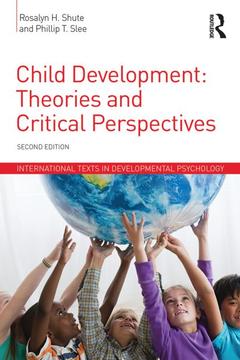Child Development (2nd Ed.) Theories and Critical Perspectives International Texts in Developmental Psychology Series

Child Development:Theories and Critical Perspectives provides an engaging and perceptive overview of both well-established and recent theories in child and adolescent psychology. This unique summary of traditional scientific perspectives alongside critical post-modern thinking will provide readers with a sense of the historical development of different schools of thought. The authors also place theories of child development in philosophical and cultural contexts, explore links between them, and consider the implications of theory for practice in the light of the latest thinking and developments in implementation and translational science.
Early chapters cover mainstream theories such as those of Piaget, Skinner, Freud, Maccoby and Vygotsky, whilst later chapters present interesting lesser-known theorists such as Sergei Rubinstein, and more recent influential theorists such as Esther Thelen. The book also addresses lifespan perspectives and systems theory, and describes the latest thinking in areas ranging from evolutionary theory and epigenetics, to feminism, the voice of the child and Indigenous theories.
The new edition of Child Development has been extensively revised to include considerable recent advances in the field. As with the previous edition, the book has been written with the student in mind, and includes a number of useful pedagogical features including further reading, discussion questions, activities, and websites of interest.
Child Development: Theories and Critical Perspectives will be essential reading for students on advanced courses in developmental psychology, education, social work and social policy, and the lucid style will also make it accessible to readers with little or no background in psychology.
1. Ways of knowing about development 2. From Darwin to DNA: biologically-based theories of development 3. A rainbow is more than the sum of its colours: beginnings of organicism 4. The child as philosopher 5. From Oedipus to attachment: the Freudian legacy 6. Mechanism: the whole is equal to the sum of its parts 7. Dialecticism: the child developing in a social world 8. The historic event: contextualism 9. Sociocultural influences on development 10. Systems theories 11. Listening to different voices 1: feminism and developmental psychology 12. Listening to different voices 2: the voices of children 13. Towards theoretical integration 14. The theory-practice nexus Appendix 1: Some historical milestone relevant for developmental psychology Appendix 2: Discussion questions, activities and selected websites
Rosalyn H. Shute is an Adjunct Professor in the School of Psychology, Flinders University, Adelaide, Australia, and Federation University, Ballarat, Australia. Her research expertise lies broadly in clinical child psychology and paediatric psychology/child health and wellbeing, and she is an experienced teacher of developmental psychology and clinical child/paediatric psychology.
Phillip T. Slee is a Professor in Human Development in the School of Education at Flinders University, Adelaide, Australia. He is a trained teacher and registered psychologist. His main areas of interest include childhood bullying/aggression, conduct disorders, stress and teacher education, and he has a particular interest in the practical and policy implications of his research.
Date de parution : 05-2015
15.6x23.4 cm
Disponible chez l'éditeur (délai d'approvisionnement : 14 jours).
Prix indicatif 58,78 €
Ajouter au panierDate de parution : 05-2015
15.6x23.4 cm
Thème de Child Development :
Mots-clés :
Social Information Processing; child development; Anorexia Nervosa; adolescent development; Young Man; Piaget; Western Developmental; Feminist psychology; High IQ Child; Translational research; Freud’s Oedipal Theory; nature versus nurture; Evolutionary Developmental Psychology; Darwinian evolutionary theory; Indigenous Psychologies; Theory of Mind; Alice Eagly; social learning theory; American Psychiatric Association; Vygotsky; Traditional Developmental Psychology; Systems Theory; Acute Schizophrenic Episode; Cross-cultural developmental psychology; Psychological Science; Bame Nsamenang; Lifespan Developmental Psychology; Critical State Theory; Freud's Psychosexual Theory; Uphill Climb; Children's Welfare; DST; Neuro Motor; Van Geert; Nikolaas Tinbergen; Freed Women; Feed Back



